In Harvey’s Wake, Evacuees Mourn Their Losses and Worry About Their Future
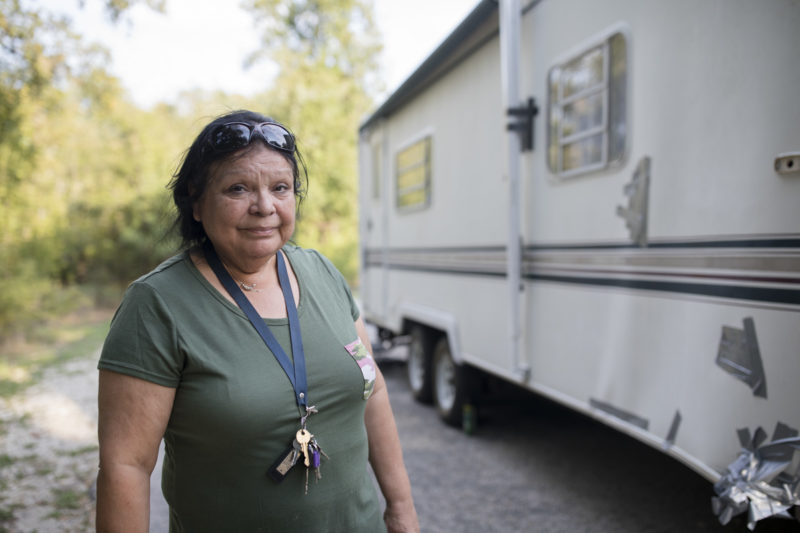
Eva Silvas, 66, evacuated her home in Corpus Christi just before Hurricane Harvey hit the coast and took nearly everything she owned. Austin Price/Reporting Texas
Hundreds of Texans have found temporary refuge in Austin and other towns after the hurricane. Reporting Texas reporters asked them to share their stories of how they survived a historic storm.
A Familiar Ordeal, But She Feels Blessed Anew
Eva Silvas doesn’t know what day it is.
For however many days, Silvas, 66, has lived in her RV at McKinney Falls State Park, in Southeast Austin. Her son, his wife and their 12-year-old son are living in another RV next to hers. And for however many days before that, they had parked their mobile shelters in Luling, as Hurricane Harvey deluged Texas with a year’s worth of rain.
Luling was where Silvas found out she had lost her home.
She had moved to Corpus Christi in June, after her landlord in Pflugerville wanted his house back for his newly married son.
“We had nowhere to go,” she said. “We looked and looked. I was paying $850 there and all of a sudden everything’s at $1,500. We couldn’t do it. So we went to Corpus.”
Listen to Eva Silvas recount her Harvey story
Her nephew had a house in the Coastal Bend city, where Silvas and her son’s family could live for free. That nephew called early last week: A tree had fallen through the roof. There’s water everywhere. Don’t come back.
“We got everything down there and had just started to settle in,” Silvas said. She pointed to her grandson Nick. “We were gonna put him in school. I guess now we’ll try to get him in online, because we don’t have an address.”
This isn’t the first time Silvas has been forced by a storm into homelessness. In 1970, a 19-year-old Silvas pounded on shelter doors as Hurricane Celia slammed the Texas coast. She and her husband had just lost everything. Their Corpus Christi home was destroyed. Shelters were full. And Silvas was on the verge of giving birth to her first child. They eventually found shelter at a cotton gin to ride out the storm. Days later, with a newborn in tow, the Silvas began to rebuild their lives.
“I cried. I thought I was never gonna be OK again,” Silvas recalled. “But I was. And I’ll be OK again.” Her husband later died.
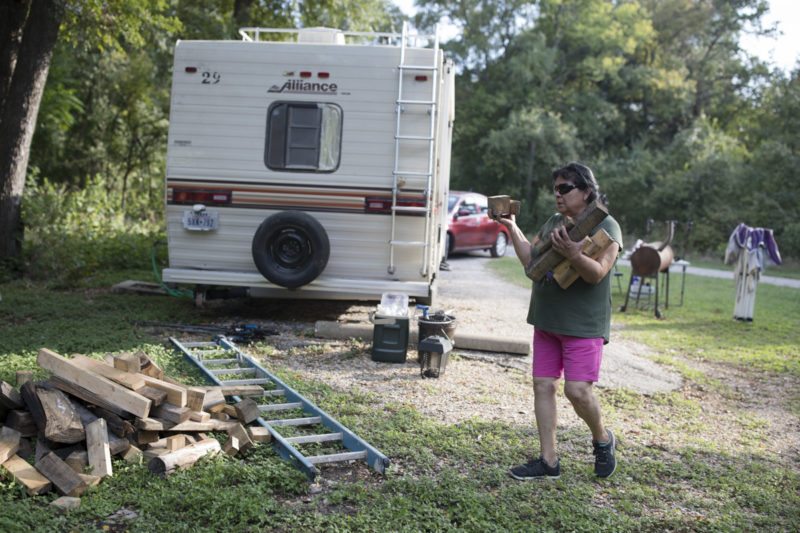
Eva Silvas is living in her RV, currently parked at McKinney Falls State Park near Austin, along with her son, daughter-in-law and grandson who occupy the adjacent campsite. Austin Price/Reporting Texas
At the campsite, Silvas and her grandson sorted through a pile of wood donated by a neighboring evacuee — along with a 3-year-old German Shepherd rescue named Oscar. Silvas agreed to adopt the dog.
She stopped to inspect storm damage to her RV.
“It’s a little banged up, but it’s good enough for me and Oscar.” She ran her hand along a thick layer of duct tape where the wind had split the fiberglass. Her new companion tugged nervously against his wire tether.
“I feel I’m blessed, and so is Oscar. He just doesn’t know it yet. I would have never found him if I hadn’t been here.”
— Austin Price
With Little to Lose, an Evacuee’s Thoughts Turn to Neighbors
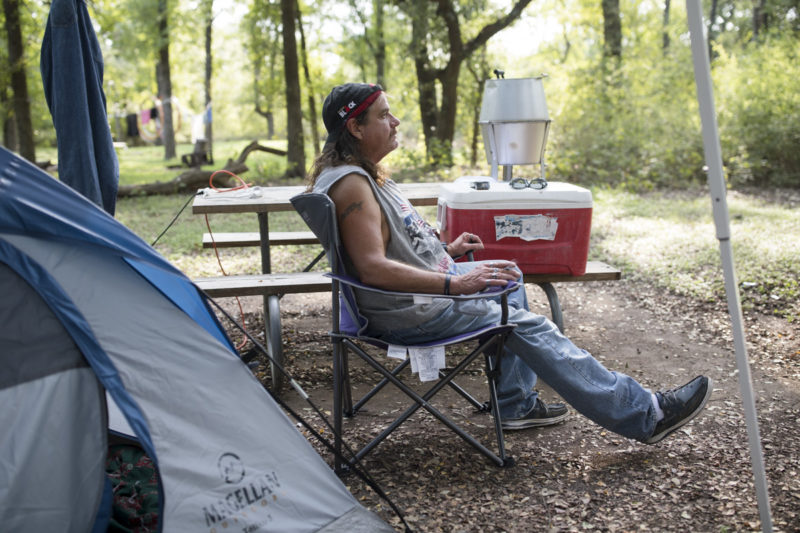
Stephen Meier, 59, lives in Angleton, south of Houston. After Harvey hit the coast, he evacuated to McKinney Falls State Park near Austin. Austin Price/Reporting Texas
Stephen Meier cleaned out his ice chest for another trip into town. He needed food for himself and his dog Peck, and a tallboy can of Budweiser and clove cigarettes. He had never before been to Austin, never planned to come here. But after three nights camping with Peck in a two-person tent at McKinney Falls, west of U.S. 183 near Austin-Bergstrom International Airport, he already knew where to find his smokes.
The 59-year-old New Mexico native turned Texan lives in Angleton in Brazoria County, about 45 miles south of Houston. Early last week, as Harvey’s rain continued to fall and floodwaters began to consume Houston’s suburbs, Meier wasted no time getting out.
“I’m up here, man. I’m safe,” he said.
He paced back and forth between his tent and his black SUV dotted with decals and Star Wars Rebel Alliance insignias. He hobbled on a bad leg, the result of a workplace injury that ended his career at a coastal refinery.
“People are dying. And then there’s people, like some friends of mine, who, even though we were forewarned, they stayed.”
“And now they’re getting their butts kicked.”
Peck, an old German Shepherd mix with a speckled gray coat, pulled against the chain collar that tethered him to a live oak and whined.
A week after the floods began in Houston, the waters of the Brazos and San Bernard rivers continued to rise in Brazoria County. At a press conference last Sunday, County Judge Matt Sebesta warned that the Brazos River in Rosharon, just north of Angleton, had plateaued at around 52.3 feet — well above its 43-foot flood stage — and would take days, if not weeks, to recede. Farther downstream, the river is expected to crest later this week, putting even more homes at risk. The area remains under mandatory evacuation.
“I was sitting in that chair this morning, bawling like a baby for these people. I ain’t too much of a man to say that,” Meier said.
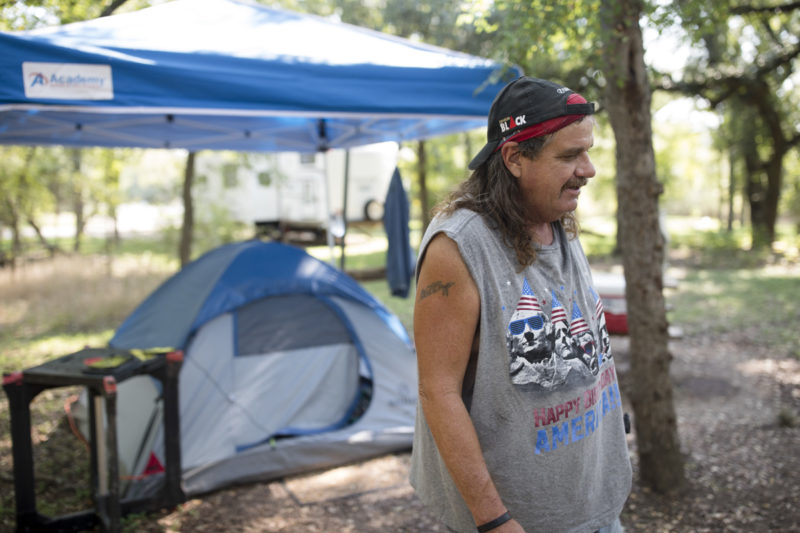
Stephen Meier, 59, lives in Angleton, south of Houston. After Harvey hit the coast, he evacuated to McKinney Falls State Park near Austin. Austin Price/Reporting Texas
He pulled up photos on his tablet computer. His county’s update page displayed aerial views of ranch-house rooftops and oak canopies peeking out from an iron-colored lake. He doesn’t seem concerned about his property as others might.
“I’ve got a little old $10,000, fifth-wheel, Whoop-de-damn-do. But for those people with a $275,000 house, with all their belongings and everything else in there, and all of a sudden, poof.”
He shook his head.
“That’s a hell of a lifestyle change.”
– Austin Price
After Harvey, He’s Had It With Texas
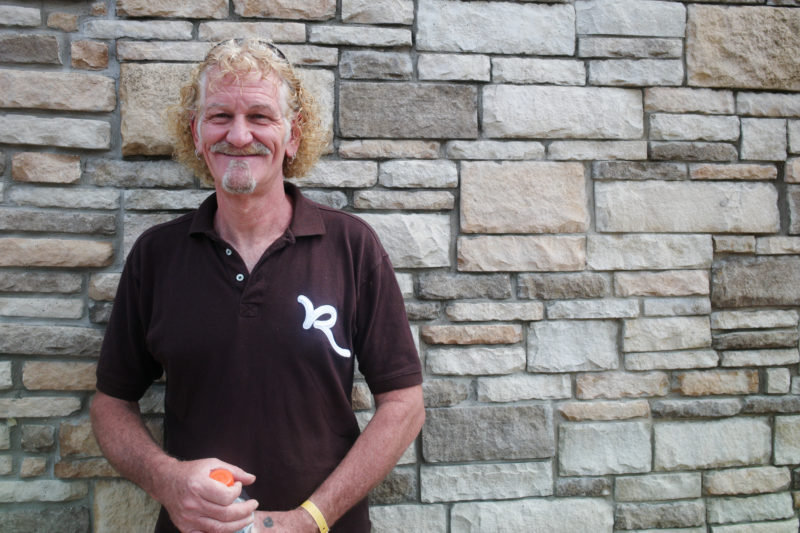
Brian Bacle, 53, was separated from his 32-year-old son in Rockport, in the aftermath of Hurricane Harvey. After evacuating to Austin, Bacle and his son were reunited thanks to a CNN reporter, who put the two in touch with a satellite phone. Scott Squires/Reporting Texas
First the wind came from one direction, Brian Bacle remembered, then it would stop and come from the other. He was riding out Harvey inside an elementary school in Rockport, which took a direct hit on Friday night, Aug. 25.
“I saw trees getting blown across the street,” he said.
Still, Bacle, 53, was relatively safe inside the elementary school. But he hadn’t heard from his son, 32-year-old Aaron Mitchell.
After city officials ordered Rockport residents to evacuate, Bacle and Mitchell had agreed to seek shelter together. When it was time to head for the school, Mitchell hadn’t shown up.
Saturday morning, Bacle stepped outside to find flag poles bent in half. By the time he boarded a bus heading to Austin, he still hadn’t heard from Mitchell. Bacle was taken to a Red Cross shelter at LBJ High School.
Then, on Monday morning, Bacle got a phone call — it was Mitchell.
Mitchell had ridden out the hurricane in his trailer. He then walked 12 miles from Aransas Pass to Rockport before being interviewed by a CNN journalist, who lent him a satellite phone. He ended up in Austin, too, on a National Guard bus.
After a tearful public reunion, Bacle checked them both into an Austin motel.
A Rockport resident since 2006, Bacle said his main source of income was a monthly disability check. He had previously worked as a bartender, as a real estate broker and at a bank.
“I’m a jack of all trades,” he said. “I do what I feel like doing.”
He said his son relished the attention of being on TV. After the storm, Bacle had help through a GoFundMe account that his son set up.
“We took some of that money out and got a hotel with it,” he said. “Now, the donations have stopped. We’re living on our disability money.”
Bacle also lost his dentures while moving between shelters.
“Had them in a glass by my bed, and someone picked them up,” he said. “They’re $1,900 teeth.” He’s currently trying to get FEMA assistance for a replacement set.
Bacle plans on returning to Rockport to assess damages and gather his belongings. But he won’t be staying.
“I’m gonna move someplace else and start over,” he said. “Somewhere where my lifestyle is accepted.” Bacle, who is gay, says there isn’t a strong LGBTQ community in Rockport.
“Someplace sunny,” he said. “California, or maybe Florida.”
– Scott Squires
“I Even Left My Bible.”
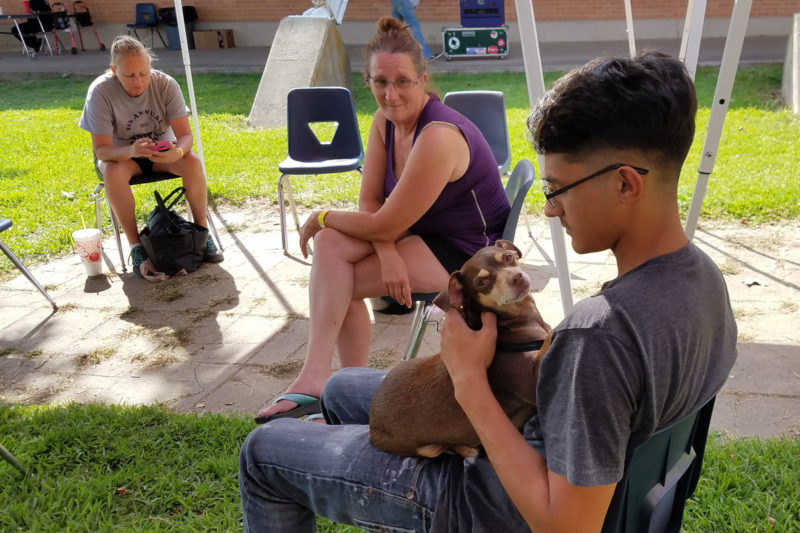
Teresa Khan, 48, sits under a canopy with her son, Sam Patel, and her service dog, Papi. They left their apartment in West Columbia about a week ago. Fairway Middle School in Killeen is their third shelter. Alexandra Paez/Reporting Texas
KILLEEN – Just three weeks before Hurricane Harvey hit, Teresa Khan, 48, and her 18-year-old son, Sam Patel, had moved into a new apartment in West Columbia, southwest of Houston. The move-in process had been slow, and they put most of their belongings in storage.
“On our day off. we would pick up another load from storage,” Khan said. She would drive her truck and Patel would do the heavy lifting.
Patel was a carpenter on a promising new job. With just three days left until the job was completed, Patel’s foreman told him he should evacuate. Patel doesn’t know if he will ever see the money he was counting on from his job.
When they left their home, they brought their dogs, Izzy and Papi. They also brought Milo, a friend’s dog that otherwise would have been left behind. Khan and her son had a duffel bag full of dog food and a few days worth of clothes. “I even left my Bible. It was just grab and go,” Khan said.
Khan is hearing impaired; Papi and Izzy are her service dogs. Her new hearing aids, which had been donated to her, are still at her storage unit in West Columbia, 55 miles southwest of Houston.
Before she left her home, she snagged the papers showing that Papi is a service dog, but left Izzy’s behind. At the Red Cross shelter at Fairway Middle School in Killeen, only service animals are allowed. When Khan arrived, a volunteer offered to take care of the other two dogs while the Khans are in Killeen.
Meanwhile, Khan grew concerned when Papi showed signs of illness after they left West Columbia. Khan worried that he had been exposed to bacteria in the flood water. A police officer at the shelter called in a local vet who gave Papi a free exam and antibiotics.
Right now, their biggest concern is their belongings in storage and going without paychecks for so long. Khan is a staff trainer at a West Columbia restaurant and gets paid every two weeks. With Hurricane Harvey interrupting work, she explains, she will be without pay for at least a month. A friend of Patel’s who stayed in West Columbia is keeping them updated on local conditions.
“Based on what he’s told me, I don’t think our stuff in storage will have made it,” Patel said.
Relying on comfort from her son and her dog, Khan is worried about money but ready to reunite with her other dogs and get back home.
“I don’t know how we’re going to do it,” she said. “I don’t wish this on my enemy.”
– Alexandra Paez
Ready to Go Home and to Thank God for Her Survival
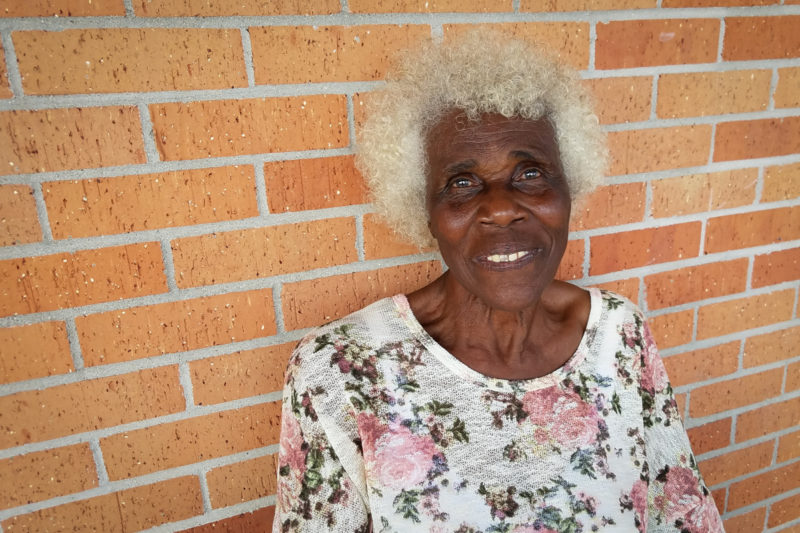
Rose Allen, 79, sits outside the shelter at Fairway Middle School with a donated Bible. Alexandra Paez/Reporting Texas
KILLEEN – Rose Allen was in high spirits as she sat outside the evacuation center at a middle school with her Bible. “We’re having a good time. Praise the Lord,” Allen said.
She insisted on being called “Big Mama,” saying that’s what everyone calls her back home in Brazoria, a small town about 65 miles south of Houston. Allen has lived there all her life. On Aug. 25, authorities told people to leave, but she didn’t. “We’re hard-headed,” she said.
Allen, 79, said she didn’t believe Hurricane Harvey would be so bad. She went to bingo the day after it hit the coast. On Aug. 27, her daughter Mary Jo told her they needed to leave town. With nothing but the clothes on her back, Allen traveled to safety with her daughter and the brother of an ex-husband. She even left her ID card behind.
Allen has been to three shelters since the storm; Fairway Middle School in Killeen is the largest. Everything she was wearing came from donation piles at the shelters — the pink capri pants, a blouse with a pattern of roses, and canvas slip-on shoes.
While Mary Jo is with her in Killeen, her other daughter, Helen, stayed behind at her trailer in Brazoria. Allen said there is no water inside her house, but her daughter tells her that the house next door is flooded.
“Seventy-nine years, and we ain’t never seen water. We blessed,” said Rose.
Allen said she’s much like television personality Judge Judy. “I speak the truth,” she said. “God is putting us together.” She praised the volunteers at the shelters for their work and kindness.
After she gets home and takes a look around, she said the first thing she will do will be to get on her knees and thank God, Allen said. “When I go home, I’m going to be a happy old woman.”
– Alexandra Paez
“I’m Alive! Everything Else is Gravy.”
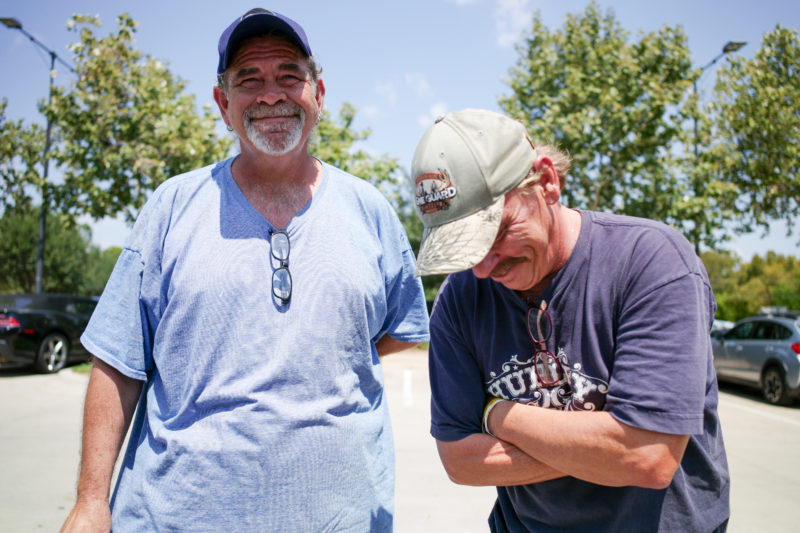
Rockport residents Lonnie Ford, 52, and Darrin Desnoo, 51, stand outside the Austin Disaster Relief Network in North Austin. “We’re trying to stick together and watch out for each other,” Ford said. Scott Squires/Reporting Texas
“The worst part, was that the storm hit in the dark,” Darrin Desnoo said. Desnoo, 51, weathered Hurricane Harvey in his RV, parked in the Peninsula Oaks subdivision in Rockport.
“There was a mandatory evacuation, but I couldn’t afford to leave,” Desnoo said. Rockport, a coastal town about 200 miles south of Austin, is where Harvey made landfall.
So Desnoo, like thousands of others, rode out the storm. FEMA told CNN that around 60 percent of Rockport residents stayed put.
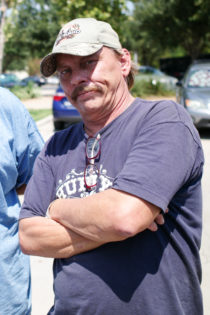
Darrin Desnoo, 51, evacuated to Austin after riding out Hurricane Harvey in Rockport. “I’m just happy to be alive,” he said.
As the winds intensified throughout the night, Desnoo saw his window-mounted air-conditioning unit sucked out of the wall and the trailer next door smashed by a falling tree. “When I saw that, I said, ‘that’s not good.’”
When another tree uprooted, it almost tipped over his RV, but yet another tree fell on it, keeping it from capsizing. “They were probably 200-year-old trees,” Desnoo said.
Desnoo was finally able to run to a nearby trailer, which was untouched. “It was just like in the movies,” he said.
At dawn, Desnoo stepped outside to see a devastated trailer park and a camera crew. “I had no shoes or shirt on, so I wasn’t really dressed for the occasion,” he said, laughing.
Desnoo stayed in Rockport until the National Guard evacuated people to Austin on Monday, three days after the storm. “When I realized there were no stores, no power, no water, and no phone, I said, ‘I’m outta here. Take me to your leader!’”
Desnoo arrived at the Red Cross Shelter at LBJ High School before being transferred to the city’s larger on Metropolis Drive in Southeast Austin. “I’m single, so I’m glad the families got taken care of. But the first thing they should have done is hand us a debit card for a hundred bucks and a phone. I haven’t gotten a penny yet and I still don’t have a phone.”
Despite the challenges of evacuating, Desnoo is just happy to be alive. “Whether I get a dime out of this, I don’t care,” he said. “I’m alive! Everything else is gravy.”
Although Desnoo worked a number of blue collar jobs, he moved to Rockport after the 2008 recession hit. “I didn’t lose everything, but after that, I moved down to Rockport to lick my wounds,” he said.
But after a warm welcome in Austin, he’s considering staying. “I think they’ve been a great host,” he said. “I plan on staying here for two or three years. It’s a wonderful town. I’ve been wanting to go to school for years, and here’s my chance.”
“I’m just ready to get back into the real world again.”
-Scott Squires
“The shelter felt like a prison”
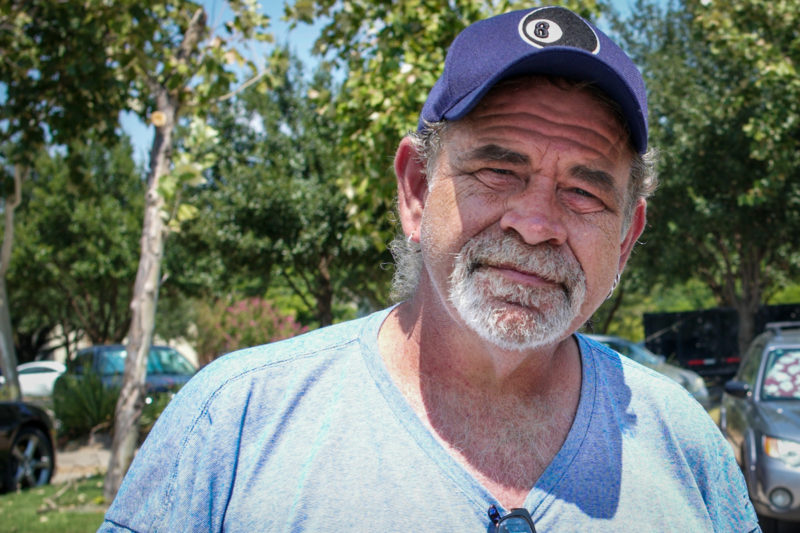
Lonnie Ford, 52, left his hometown of Rockport and stayed for a few days at the Austin Red Cross shelter. He moved to a Motel 6, complaining about conditions at the shelter. Scott Squires/Reporting Texas
Harvey made short work of Lonnie Ford’s house in Rockport.
Ford, 52, had been out of town when the storm hit. When he returned home, he found “both doors blown off, all the trees in the backyard layin’ down, the holes in the roof, the windows busted up.”
He gathered what he could and left. “I grabbed some clothes, two pillows, some blankets and my laptop.” But he said he found little refuge at city shelters in Austin — first at the LBJ High School gymnasium, then at the larger shelter in Southeast Austin, run by the Red Cross,
“I felt like a child in there,” Ford said. “I was shuffled around like a yo-yo.”
Ford said he felt that operations at the shelter were disorganized. “We could find out more talking to each other than from anyone in the Red Cross,” he said.
The shelter, which has a 10 p.m. curfew, “felt like a prison,” according to Ford. “They’re supposed to be helping hurricane survivors, and they treat us like jailbirds.”
There wasn’t enough food, he said, and he gave up trying to wash his clothes because, at first, there were too few washing machines for a shelter housing about 360 people.
So Ford, whose only income is a monthly disability payment because of his bipolar and manic-depressive disorders, checked himself into a Motel 6 in North Austin “I paid for two nights here on my own,” he said. “To me, it’s not right.”
Ford said he’s filed paperwork to get housing assistance and money to replace some of his lost personal effects. “I’m basically just waiting on FEMA to do something—you know, accept it, or deny the claim.”
If he doesn’t receive assistance soon, Ford plans to return to Kentucky, where his children live.
Despite his experience, Ford is upbeat. “I’ve always been ‘built Ford tough’,” he said, borrowing the carmaker’s slogan about its trucks and flexing his biceps above his head.
“Most of us were able to smile at everybody else, laugh once in a while. We’ve all been through it, so there’s no reason to cry.”
– Scott Squires
“We didn’t figure it was going to be that bad”
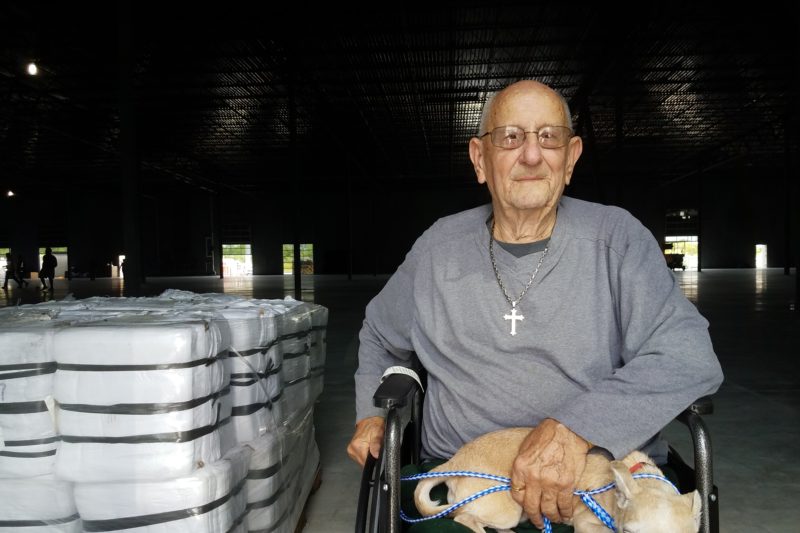
Jimmy Thornhill holds Coco, his Chihuahua-mix dog, after walking him in front of the main evacuee center located in South Austin. After Hurricane Katrina, federal law authorizes FEMA to provide rescue, care, and shelter for individuals with household pets and service animals. Omar Rodriguez/Reporting Texas
Twyla and Jimmy Thornhill hunkered down the Rockport house where they’ve lived for 15 years, watching Hurricane Harvey destroy it, piece by piece.
“We didn’t figure it was going to be that bad. We live in a cinderblock house,” said Twyla Thornhill, 67, about their home, which is 20 blocks from Aransas Bay.
Things got worse when the eye of the hurricane passed over and Harvey’s force hit again.
“That’s when it lifted the roof. Everything started happening. The water started running on the inside walls,” Twyla Thornhill said.
The “nasty water,” as she calls it, flooded her house and eventually caused an infection in an earlier wound on one foot. When the couple reached an evacuee center Austin, she had to go to a hospital for treatment.
She uses a walker; her husband gets around in a wheelchair. When the storm cleared, they found a ride to a bus that took them to Austin. Last Sunday, they were safe at an evacuee center in Southeast Austin.
Jimmy Thornhill, 79 said they plan to go back in a month. But he doesn’t know if their house is repairable. They’re waiting for a call from FEMA to see whether they qualify for federal aid.
Jimmy Thornhill said they had been treated well at the evacuee center, where they are staying with their dogs Coco and Gracie.
“They have been awful nice and I have nothing to complain about,” he said.
– Omar Rodriguez Ortiz
“We could have lost our lives”
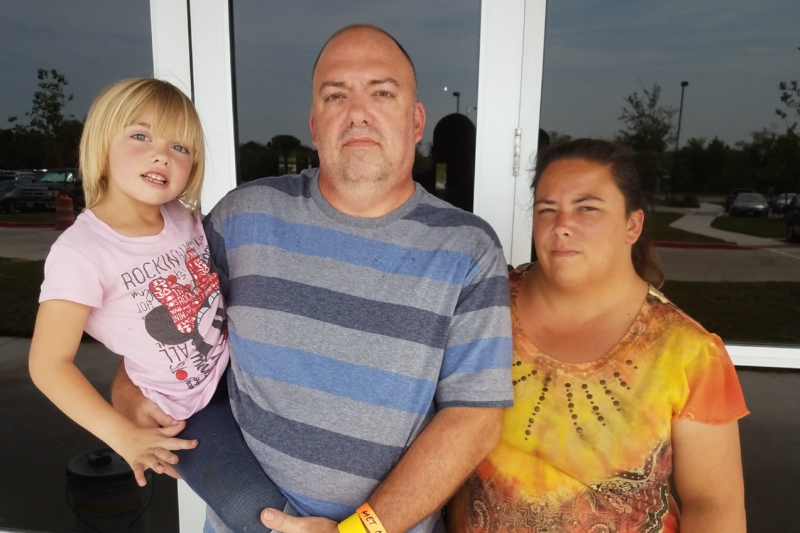
Roy Edler Jr. had not seen anything like Hurricane Harvey in Aransas Pass since his mom moved there with him 30 years ago. His wife Stephanie, their five-year-old daughter, and Roy were waiting for bus 228 to go to Walmart to spend quality time away from the commotion of the main evacuee center in Austin. Omar Rodriguez/Reporting Texas
The house was no match for Harvey’s 130 mile-an-hour winds. But Roy and Stephanie Elder and their daughter, 5, were safe in Roy’s mother’s kitchen.
Aransas Pass, a coastal town of about 9,000 residents between Corpus Christi and Rockport, had never seen anything like it during the 30 years he has lived there.
“It first took the roof off, then the water and the wind broke the ceiling and it came crashing,” said Roy Elder, 48.
The family had been living in a motel, but moved to his mother’s house as the hurricane approached.
When local authorities issued a mandatory evacuation order, Roy called the police station to understand what that meant.
The receptionist told them “we could stay if we want, but at some point, they will not be able to respond.”
Because the couple don’t have a vehicle, Elder asked if there was a bus or other transportation to get them out of harm’s way. “She told me ‘No, we are not doing that’,” said Edler.
“We almost lost our lives staying because the place we stayed in, part of it got demolished. Thankfully the room we stayed was the only one left but we could have…,” he said, not finishing the sentence.
“We rode out the hurricane there but then there was no water, no electricity. All the stores were boarded up and closed,” he said.
After Harvey had moved on, the couple walked to City Hall and found a bus that would take them to an evacuee center in Corpus Christi. A few days later, they were moved to a shelter at the Toney Burger Activity Center in Austin, and then again to an evacuee center on the outskirts of Austin.
The couple wish they had been able to save their daughter’s baby pictures. Now they need a home or at least somewhere to stay where they won’t get pushed out again.
Stephanie Elder, 33, also desperately needs a job because they are running out of money. She had been a cashier at an Aransas Pass dollar store. Her husband can’t work for health reasons.
Their daughter – they did not give her name — plays at the evacuee center like there is not a care in the world but once in a while she asks when are they going back home. Asked how he responds, Elder said he tells her: “There is no home.”
– Omar Rodriguez Ortiz
Family vacation ends at an Austin shelter
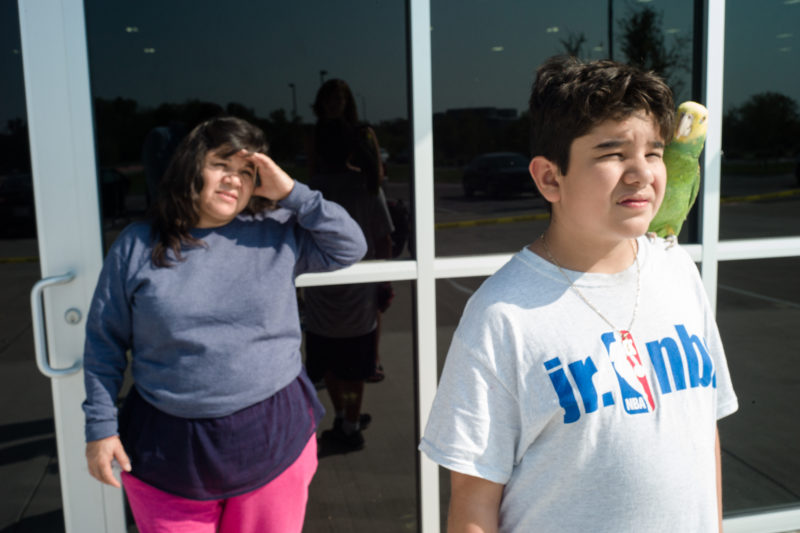
Flor Guerrero, her husband, son and pet parrot Polly were among the first evacuees to move into Austin’s shelter in Southeast Austin. The family was unable to return to their Houston home when the storm hit. Scott Squires/Reporting Texas
The blazing sun reflected intensely on the office park building in Southeast Austin last Friday, which was being hastily transformed into a Red Cross shelter. Showers and other amenities were being installed in anticipation of Hurricane Harvey evacuees who were expected to arrive that day. A Cap Metro employee was working out a route for a bus that would serve evacuees.
The Guerrero family – Flor, husband Jose and their 13-year-old son — had been one of the first families to move into the shelter, and were making their way back after taking a walk. Polly, a four-year-old, yellow-headed Amazon parrot, was perched on the boy’s shoulder. A passing Red Cross volunteer told the boy that his pet needed to be in a cage.
“It sings, but it doesn’t make a lot of noise,” Guerrero, 48, said. “We weren’t going to let it die in a storm.”
The Guerreros were on vacation in Austin when Harvey made landfall. The the storm looped around to dump record amounts of rain on the Houston area. The family lives southwest of the city near Richmond and Rosenberg.
As the floodwaters rose, the family headed home — only to find the roads closed. They turned around, returning to Austin in search of a shelter.
The family had no idea about the state of their house or their neighborhood. They didn’t know whether school would start on time.
“Classes were supposed to start on Tuesday,” Flor Guerrero said. “They told us that they’d write us when they knew about classes, but right now, we don’t know how it is there, or whether they’ll start classes on time or not.”
– Louise Rodriguez and Scott Squires
Happy birthday at an Austin shelter
After authorities issued a mandatory evacuation order, Erica Ortiz Franklin, 42, didn’t think twice about leaving a Victoria shelter and hopping on a bus that eventually would take her family to Austin.
Her father, husband Mike Jones, daughter Micaela, son-in-law and their child were with her for what is normally a 2.5-hour trip. Instead, it became a 16-hour nightmare.
“We were supposed to go to a small town near us to follow a caravan and pick up some people,” said Ortiz Franklin. But the bus ahead of them got stuck in the mud, blocking the route for the other buses.
One of four buses carrying disabled and elderly people had an accident on an unlighted gravel road while heading southeast, trying to reach Bloomington. At 1 a.m., amid pouring rain, they were stuck farther from Austin but closer to Hurricane Harvey.
Ortiz Franklin, who is temporarily in a wheelchair after surgery following a January car accident, was scared, but there wasn’t anything she could do.
After the passengers were moved to another bus, the caravan changed course and headed to San Antonio, only to find out that the shelter was reserved for Houston evacuees, according to Ortiz Franklin, an insurance agent.
Twelve hours had passed and they hadn’t reached their final destination.
Ortiz Franklin’s family spent several days at a shelter LBJ High School in Austin, where she celebrated her birthday on Aug. 26. To her surprise, a fellow evacuee walked a mile to buy her a chocolate cookie cake at H-E-B.
“I’m gonna cry,” said Ortiz Franklin while she was telling the story.
Then she and others were moved to still another shelter, in Southeast Austin. Ortiz Franklin said she’s is staying put.
“I don’t want to go to no more shelters. Everybody that is here is together. Why do I want to go there and meet people I don’t know?” she asked.
— Omar Rodriguez Ortiz
Kaulie Lewis and Louise Rodriguez contributed to this story.